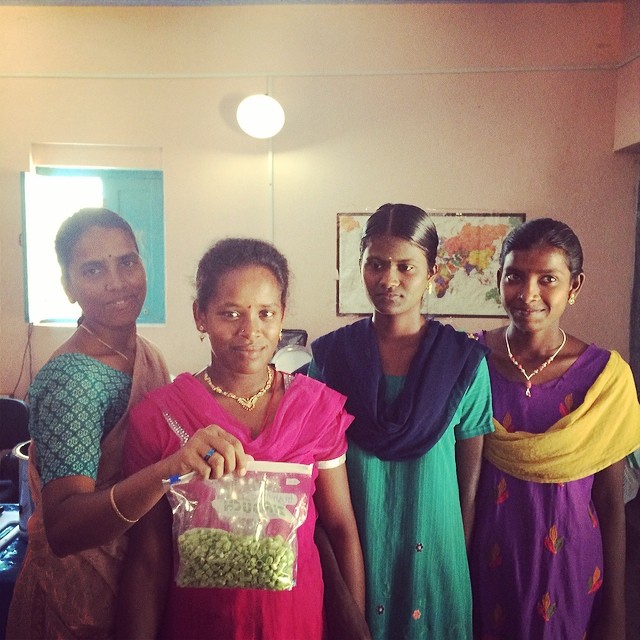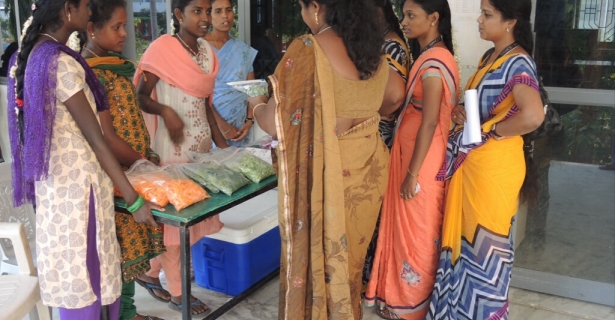Gautam Kapur (’16) is majoring in Economics and International Relations with a minor in Entrepreneurial Leadership Studies. He is a member of the BUILD:India Summer 2014 trip.
Indian villagers are no strangers to urbanization.
This seems like an obvious statement. As India’s economic growth has accelerated over the past few decades, cities such as New Delhi, Mumbai, and Chennai have received an influx of low-skilled migrant labor from rural areas.
Yet the byproducts of this rampant rural-urban migration are often overlooked. In the heart of India’s villages, many families are broken apart—sometimes permanently—in the raw pursuit of financial stability.
This May, BUILD’s 2014 Summer Trip Team left for Thottiyapatti, Tamil Nadu with the belief that the solutions to villagers financial problems do not only exist in India’s cities, but can also be found at home.
BUILD’S INCOME GENERATION SCHEME
Our Income Generation Scheme aims to provide Thottiyapatti females with a stable source of additional weekly income of approximately INR 300 each. For example, Prema earns INR 1250 per month and BUILD increased her income by approximately 20%. The scheme involves the provision of pre-cut fresh vegetables to time challenged students studying at a nearby private university.
Through this scheme participants cut fresh vegetables at BUILD’s NGO partner, Payir, and travelled to M.A.M. College of Engineering in Trichy to sell their pre-cut vegetable packages in the first trial. As our customer base successfully expanded beyond hostel students to day students and faculty in the second trial, we added nutritional laddoos and handbags manufactured at Payir for sale at our makeshift bazaar in M.A.M.’s foyer.
In moving forward with BUILD’s mission of female empowerment, only women are employed by the income generation scheme. Prema, Rajalakshmi, Aarayee Akka, and Sushila were the four pioneers that participated in the trial runs which BUILD oversaw from May to June. Upon completion of the two trials, all the girls expressed their interest in returning to M.A.M. for another day of selling. Their eagerness is an important indicator that gives us confidence in the sustainability of our project.
However, the benefits of our income generation project are not solely visible through an economic lens. For instance, these women—who typically do not leave Thottiyapatti or Payir—now have a financial incentive to gain exposure to a world outside of their immediate comfort zone. I specifically recall the powerful image of Prema reuniting with her childhood friend at M.A.M. college, whom she had not seen for months as they had no means by which to stay in contact. Although India has the world’s second-largest mobile phone user base, there is still a very visible rural-urban digital divide. Of course, Prema’s friend was treated to a complimentary plate of laddoos.
LESSONS LEARNED AT BUILD
Despite being an organization based in Boston, BUILD can propel the Thottiyapatti community towards realizing their full potential by focusing on local solutions for local problems.
The simplicity behind BUILD’s Income Generation has brought a newfound sense of optimism, both in Boston and Thottiyapatti. In previous years, attempts to establish a soap making venture, sathumaavu production business, and kolam design enterprise proved to be too capital-intensive to sustain over time. The lessons we learned from BUILD’s previous endeavors were crucial in planning the structure of our pre-cut vegetable enterprise.
By maintaining low fixed costs and utilizing a supply of locally sourced goods, the pre-cut vegetable enterprise has a strong cost structure that we believe can withstand volatile vegetable prices for the next six months, when the Winter Trip Team will implement any necessary changes based on the results of our data.
This enterprise identified two related needs in Thottiyapatti and M.A.M. and used one existing platform—local vegetables—to fill it. BUILD is confident that the straightforwardness and innovation behind our self-sustaining pre-cut vegetable enterprise will prove worthwhile.
As BUILD returns to Tufts for the academic year, we are hopeful that we can continue to sustainably support families financially and provide leadership opportunities for underrepresented members of the Thottiyapatti community.



Add new comment